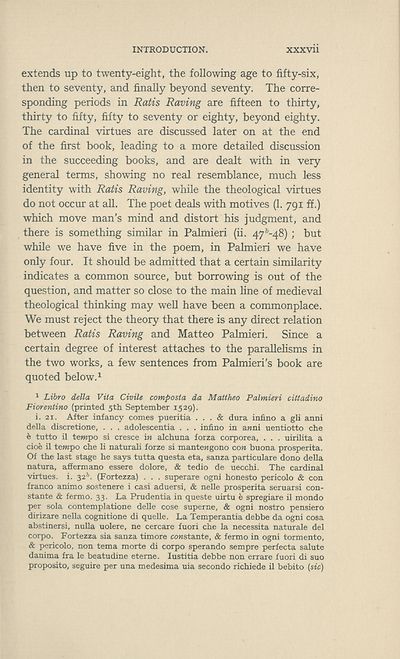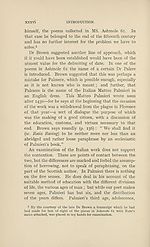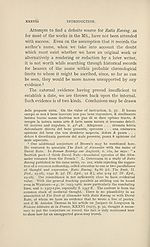Scottish Text Society publications > Third series > Ratis raving and other early Scots poems on morals
(47)
Download files
Complete book:
Individual page:
Thumbnail gallery: Grid view | List view

INTRODUCTION.
XXXVU
extends up to twenty-eight, the following age to fifty-six,
then to seventy, and finally beyond seventy. The corre¬
sponding periods in Ratis Raving are fifteen to thirty,
thirty to fifty, fifty to seventy or eighty, beyond eighty.
The cardinal virtues are discussed later on at the end
of the first book, leading to a more detailed discussion
in the succeeding books, and are dealt with in very
general terms, showing no real resemblance, much less
identity with Ratis Raving, while the theological virtues
do not occur at all. The poet deals with motives (1. 791 ff.)
which move man’s mind and distort his judgment, and
there is something similar in Palmieri (ii. 47&-48) ; but
while we have five in the poem, in Palmieri we have
only four. It should be admitted that a certain similarity
indicates a common source, but borrowing is out of the
question, and matter so close to the main line of medieval
theological thinking may well have been a commonplace.
We must reject the theory that there is any direct relation
between Ratis Raving and Matteo Palmieri. Since a
certain degree of interest attaches to the parallelisms in
the two works, a few sentences from Palmieri’s book are
quoted below.1
1 Libro della Vita Civile composta da Mattheo Palmieri cittadino
Fiorentino (printed 5th September 1529).
i. 21. After infancy comes pueritia ... & dura infino a gli anni
della discretione, . . . adolescentia . . . infino in awni uentiotto che
e tutto il tempo si cresce in alchuna forza corporea, . . . uirilita a
cioe il tempo che li natural! forze si mantewgono con buona prosperita.
Of the last stage he says tutta questa eta, sanza particulare dono della
natura, affermano essere dolore, & tedio de uecchi. The cardinal
virtues, i. 32'’. (Fortezza) . . . superare ogni honesto pericolo & con
franco animo sostenere i casi aduersi, & nelle prosperita seruarsi con-
stante & fermo. 33. La Prudentia in queste uirtu e spregiare il mondo
per sola contemplatione delle cose superne, & ogni nostro pensiero
dirizare nella cognitione di quelle. La Temperantia debbe da ogni cosa
abstinersi, nulla uolere, ne cercare fuori che la necessita naturale del
corpo. Fortezza sia sanza timore ccmstante, & fermo in ogni tormento,
& pericolo, non tema morte di corpo sperando sempre perfecta salute
danima fra le beatudine eterne. lustitia debbe non errare fuori di suo
proposito, seguire per una medesima uia secondo richiede il bebito (sic)
XXXVU
extends up to twenty-eight, the following age to fifty-six,
then to seventy, and finally beyond seventy. The corre¬
sponding periods in Ratis Raving are fifteen to thirty,
thirty to fifty, fifty to seventy or eighty, beyond eighty.
The cardinal virtues are discussed later on at the end
of the first book, leading to a more detailed discussion
in the succeeding books, and are dealt with in very
general terms, showing no real resemblance, much less
identity with Ratis Raving, while the theological virtues
do not occur at all. The poet deals with motives (1. 791 ff.)
which move man’s mind and distort his judgment, and
there is something similar in Palmieri (ii. 47&-48) ; but
while we have five in the poem, in Palmieri we have
only four. It should be admitted that a certain similarity
indicates a common source, but borrowing is out of the
question, and matter so close to the main line of medieval
theological thinking may well have been a commonplace.
We must reject the theory that there is any direct relation
between Ratis Raving and Matteo Palmieri. Since a
certain degree of interest attaches to the parallelisms in
the two works, a few sentences from Palmieri’s book are
quoted below.1
1 Libro della Vita Civile composta da Mattheo Palmieri cittadino
Fiorentino (printed 5th September 1529).
i. 21. After infancy comes pueritia ... & dura infino a gli anni
della discretione, . . . adolescentia . . . infino in awni uentiotto che
e tutto il tempo si cresce in alchuna forza corporea, . . . uirilita a
cioe il tempo che li natural! forze si mantewgono con buona prosperita.
Of the last stage he says tutta questa eta, sanza particulare dono della
natura, affermano essere dolore, & tedio de uecchi. The cardinal
virtues, i. 32'’. (Fortezza) . . . superare ogni honesto pericolo & con
franco animo sostenere i casi aduersi, & nelle prosperita seruarsi con-
stante & fermo. 33. La Prudentia in queste uirtu e spregiare il mondo
per sola contemplatione delle cose superne, & ogni nostro pensiero
dirizare nella cognitione di quelle. La Temperantia debbe da ogni cosa
abstinersi, nulla uolere, ne cercare fuori che la necessita naturale del
corpo. Fortezza sia sanza timore ccmstante, & fermo in ogni tormento,
& pericolo, non tema morte di corpo sperando sempre perfecta salute
danima fra le beatudine eterne. lustitia debbe non errare fuori di suo
proposito, seguire per una medesima uia secondo richiede il bebito (sic)
Set display mode to: Large image | Zoom image | Transcription
Images and transcriptions on this page, including medium image downloads, may be used under the Creative Commons Attribution 4.0 International Licence unless otherwise stated. ![]()
| Publications by Scottish clubs > Scottish Text Society publications > Third series > Ratis raving and other early Scots poems on morals > (47) |
|---|
| Permanent URL | https://digital.nls.uk/106919905 |
|---|
| Description | A collection of over 100 Scottish texts dating from around 1400 to 1700. Most titles are in Scots, and include editions of poetry, drama, and prose by major Scottish writers such as John Barbour, William Dunbar, Gavin Douglas, and George Buchanan. Edited by a key scholarly publisher of Scotland's literary history, and published from the late 19th century onwards by the Scottish Text Society. Available here are STS series 1-3. |
|---|

